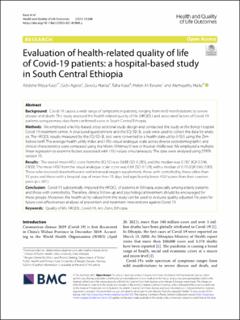| dc.contributor.author | Kaso, Abdene Weya | |
| dc.contributor.author | Agero, Gebi | |
| dc.contributor.author | Hurisa, Zewdu | |
| dc.contributor.author | Kaso, Taha | |
| dc.contributor.author | Ewune, Helen Ali | |
| dc.contributor.author | Hailu, Alemayehu | |
| dc.date.accessioned | 2022-01-31T07:37:40Z | |
| dc.date.available | 2022-01-31T07:37:40Z | |
| dc.date.created | 2022-01-05T00:07:42Z | |
| dc.date.issued | 2021 | |
| dc.identifier.issn | 1477-7525 | |
| dc.identifier.uri | https://hdl.handle.net/11250/2975778 | |
| dc.description.abstract | Background
Covid-19 causes a wide range of symptoms in patients, ranging from mild manifestations to severe disease and death. This study assessed the health-related quality of life (HRQOL) and associated factors of Covid-19 patients using primary data from confirmed cases in South Central Ethiopia.
Methods
We employed a facility-based, cross-sectional study design and conducted the study at the Bokoji Hospital Covid-19 treatment centre. A structured questionnaire and the EQ-5D-3L scale were used to collect the data for analysis. The HRQOL results measured by the EQ-5D-3L tool were converted to a health state utility (HSU) using the Zimbabwe tariff. The average health utility index and HSU–visual analogue scale across diverse sociodemographic and clinical characteristics were compared using the Mann–Whitney U test or Kruskal–Wallis test. We employed a multiple linear regression to examine factors associated with HSU values simultaneously. The data were analysed using STATA version 15.
Results
The overall mean HSU score from the EQ-5D was 0.688 (SD: 0.285), and the median was 0.787 (IQR 0.596, 0.833). The mean HSU from the visual analogue scale score was 0.69 (SD: 0.129), with a median of 0.70 (IQR 0.60, 0.80). Those who received dexamethasone and intranasal oxygen supplement, those with comorbidity, those older than 55 years and those with a hospital stay of more than 15 days had significantly lower HSU scores than their counterparts (p < .001).
Conclusion
Covid-19 substantially impaired the HRQOL of patients in Ethiopia, especially among elderly patients and those with comorbidity. Therefore, clinical follow-up and psychological treatment should be encouraged for these groups. Moreover, the health utility values from this study can be used to evaluate quality adjusted life years for future cost-effectiveness analyses of prevention and treatment interventions against Covid-19. | en_US |
| dc.language.iso | eng | en_US |
| dc.publisher | BMC | en_US |
| dc.rights | Navngivelse 4.0 Internasjonal | * |
| dc.rights.uri | http://creativecommons.org/licenses/by/4.0/deed.no | * |
| dc.title | Evaluation of health-related quality of life of Covid-19 patients: a hospital-based study in South Central Ethiopia | en_US |
| dc.type | Journal article | en_US |
| dc.type | Peer reviewed | en_US |
| dc.description.version | publishedVersion | en_US |
| dc.rights.holder | Copyright The Author(s) 2021 | en_US |
| dc.source.articlenumber | 268 | en_US |
| cristin.ispublished | true | |
| cristin.fulltext | original | |
| cristin.qualitycode | 1 | |
| dc.identifier.doi | 10.1186/s12955-021-01900-y | |
| dc.identifier.cristin | 1974807 | |
| dc.source.journal | Health and Quality of Life Outcomes | en_US |
| dc.identifier.citation | Health and Quality of Life Outcomes. 2021, 19, 268. | en_US |
| dc.source.volume | 19 | en_US |

